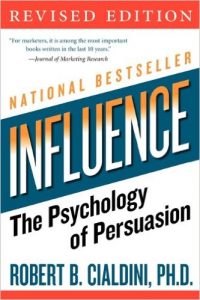
This is part of an ongoing series of organizational and personal improvement book reviews. This month, we review Robert Cialdini’s 1984 classic Influence: The Psychology of Persuasion. The book is required reading for anybody in marketing and every business leader. Have you ever made a major purchase or important decision under pressure that you regretted later? Your decision was likely influenced by one of the six principles Cialdini shares in the book. Learn about these six principles and how to avoid being manipulated by them.
Note that while Cialdini identified six principles in Influence: The Psychology of Persuasion, he added a seventh principle in his 2016 follow-up,
The 6 Principles of Persuasion
Reciprocity:
When presented with a gift or act of kindness, people tend to return the favor. Marketers provide free samples to take advantage of this, and even as kids, we learn it is wise to compliment a parent or teacher before asking for something. When your friend or associate buys you lunch, don’t you feel obligated to offer to pay the next time?
Scarcity:
Perceived scarcity generates demand and influences us to act. Opportunities seem more valuable to us when their availability is limited. For example, saying offers are available for a “limited time only” encourages sales. One way to reduce the influence of scarcity is to shop for major purchases (such as a new car) without bringing any method of payment with you. Now, you will be forced to stop and consider an offer without the ability to buy. Any real offer isn’t going to expire at the end of the day. Loss aversion is an important related concept studied by behavioral economists. Experiments show that the fear of loss is always greater than the desire for gain. Consider how you would feel about a potential 1% rise in pay versus a 1% pay cut?
Social Proof:
People often do things they see other people doing. For example, one experimenter would stop on a city street and just look up into the sky; bystanders would then look up into the sky to see what they were seeing. Have you ever ignored an ad for a car or house because it has been on the market for too long? We all assume that if it hasn’t sold already, there must be an issue.
I recently sold an automobile in a private sale to the first person who looked at the car. When I mentioned that I had four more appointments that day, he had social proof that others were interested, plus a feeling of scarcity since others might buy the car later in the day. He immediately offered to buy the vehicle at my asking price.
Commitment and Consistency:
When people commit to an idea or goal (in writing or to their peers), they are more likely to honor that commitment. This is why writing down personal and organizational goals is so important and why “anti-charities” are proven to help individuals achieve their personal goals. Is this commitment and consistency also why Christians continue to vote for Republicans in elections, even when most core values aren’t in agreement?
Authority:
People will tend to obey authority figures, even if they are asked to perform objectionable acts. Cialdini cites incidents such as the Milgram experiments in the early 1960s and the My Lai massacre. Different cultures tend to respond differently to authority based on social norms. Be sure to stop and logically consider any request on its own merits and ask, “Is this decision in agreement with my values?” As a leader, always be sure to confirm that your authority isn’t the only reason employees agree with your decisions.
Liking:
People are more easily persuaded by people they like, are attracted to, or feel they can relate to. Cialdini cites the marketing of Tupperware in what might now be called viral marketing. Facebook has built a massive network based on this principle, as we tend to favor causes our friends also like. This principle can also explain why teams often consist of people with similar backgrounds and personalities. Our organization avoids this “groupthink” issue by making “team diversity” an identified core value.
We also respond favorably to compliments. Anyone who reads this entire post must be incredibly smart and a great person, plus you believe in making yourself even better! While we all love receiving compliments, make sure they are justified and not just being used so you will like that salesperson (or maybe your boss or your date) a little bit more. I’m sure you, dear reader, are much too wise to fall for a trick like that . . .
The New 7th Principle
Cialdini released
Unity:
Unity is a shared identity between the influencer and the influencee. We are more likely to be influenced by people we perceive as part of our group, team, family, or unit. Here are a few ways to use “unity” for influence:
- If you are influencing someone, look for commonality. What teams or politicians do you both like? How is your style or fashion sense related?
- Use family language in your advice. For example, “Here is what I would advise my son or daughter to do in this situation.”
- Include people in your decision-making process so they feel part of the solution.
Below is our video summary of all seven of Cialdini’s principles of persuasion.
Summary
Influence: The Psychology of Persuasion is an important read for any leader. Some may use these principles to become a more skilled persuader, but everyone should understand how to defend against these principles being used to influence you.
Read our post Decisive: How to Make Better Choices in Life and Work next.


Related Posts
How to Use Kotter’s 8-Step Process for Leading Change
The Continuing Evolution of the Employee Using AI
10 Great Leadership Lessons from Elon Musk II